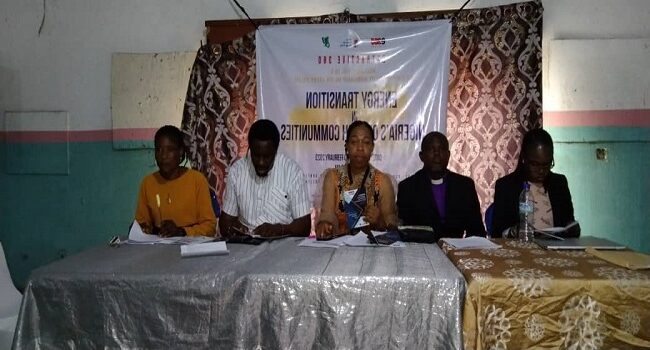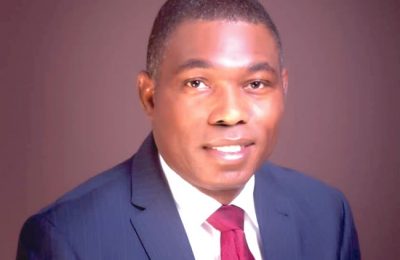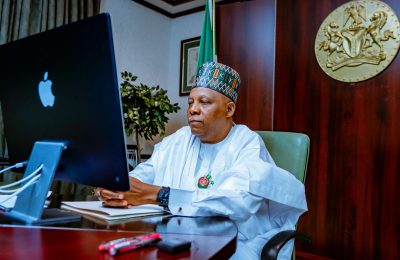By-Ebenezer Adurokiya, Warri
Stakeholders have expressed worries over the Federal Government’s failure to put the plight of host communities into consideration in the implementation of the Nigeria’s Energy Transition (ETF) plans.
They are also concerned whether Nigeria would meet the 2060 target to end the use of crude oil in respect to the FG’s commitment to ETP vis a vis the challenges bedevilling the nation’s cashless policy.

Speaking at a one-day community workshop on Energy Transition in Nigeria’s oil rich communities for Delta State held at DSC 2, Permanent Camp Conference Hall, Udu, near Warri, weekend, the stakeholders bemoaned the badly-implemented ongoing cashless policy and naira redesigned that have put the common man on edge would greatly impact the oil-bearing communities and their ways of life.
The workshop was organised by Extractive360 in partnership with Spaces for Change and support from a Ghana-based Africa Centre for Energy Policy (ACEP), expressed concerns over federal government failure to put the plight of the host communities into consideration in the implementation of the Nigeria’s Energy Transition plans.
Executive Director of Extractive360 (e-360), Juliet Ukanwosu, said that the workshop was tailored to create awareness about the new reality in the global energy space and how it can affect oil-producing communities in Delta State.
Ukanwosu, who was represented by Dr Mercy Makpor, Senior Research Officer at E-360, said that the event was a significant one meant to sensitize participants about the global energy transition campaign, how it relates to Nigeria’s Energy Transition plans and how it will impact on host communities and present ways of life.

She noted that the Niger Delta, where the nation’s oil wealth is being exploited from over the years, has been left with devastating effects, from environmental degradation to air and water pollutions.
“It is needless to state that many communities have lost their farmlands and rivers, which is their primary means of livelihood as a result of oil exploration. Everyone here today knows of these negative effects. I’m sure everyone has a unique story to tell.
“While, we are yet seeking justice for this age-long environmental injustice in the Niger Delta, the new reality is the move from crude oil to renewable energy sources.
“What this means is that the world is moving away from the use of oil to more environmentally friendly energy sources such as wind, water, and solar.
“This is a global move following the Paris Agreement; it is not about Nigeria alone. Countries have committed to different dates when they intend to stop the use of crude oil.
“This means that very soon, no one will be buying Nigeria’s oil. Nigeria itself has committed to end the use of crude oil by the year 2060.
“The question now is, when this target is met, what happens to the people of the Niger Delta?
“The people in Delta State whose environments have been devastated?
“What alternative livelihoods can they have? What new jobs can they engage in? How well did Nigeria do to include the opinions of communities in the Energy Transition Plan (ETP)? What plans are there for environmental clean-up?” Juliet Ukanwosu asked rhetorically.
Addressing journalists on the sidelines of the event, representative of Spaces for Change, Chetachi Louis Odeh, said that about four nongovernmental organizations collaborated to carry out the research on the Energy Transition Plan (ETP) and had made recommendations to the Federal Government.
“We discovered that the national transition plan was silent on the perspective of the oil rich communities where oil extraction has been going on for decades and that was what brought about our going into the communities to hear from the communities where the oil is taken out from to know their interest and concerns.
“Transiting to a greener energy or another source of energy is a very beautiful idea, but we are saying that if that is going to be done, the communities where extraction have gone on for decades shouldn’t be left the way the oil companies left them.
“A lot of things have happened to their environment and nobody is saying how the environment will be taken back to their former position before the extraction.
“We are transiting to another source of energy then what are the alternatives put in place before the community members? How are they going to survive, how are they going to move on? They have depended so much on fossil fuel, on extraction of crude oil, if you then remove it from them, how’re they going to cope ?
“These, and more are our concerns towards the national plan and we have to move into the communities to get their perspective,” Odeh noted.







